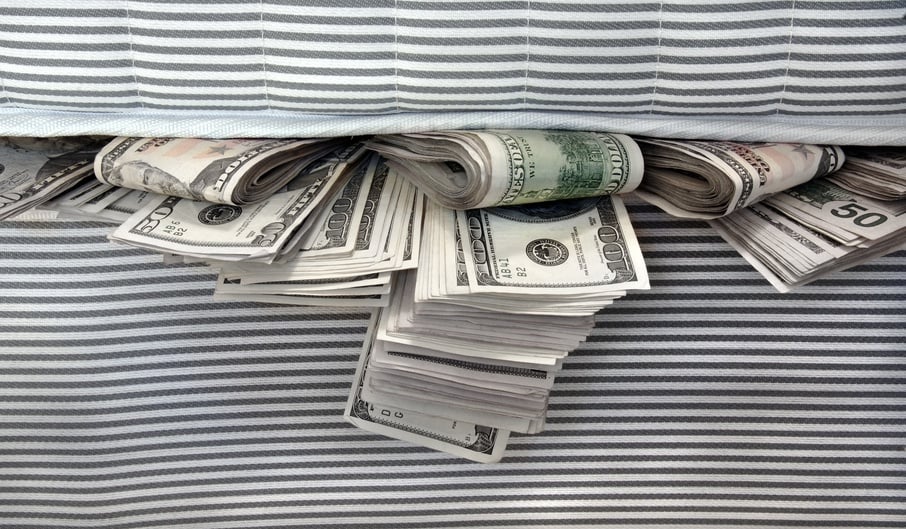How Much Money Does the Average American Have in Their Bank Account?

A bummed American, with little in his bank account, is counseled by his wife | Hulton Archive/Getty Images
Despite living in what is likely the wealthiest nation to ever have existed, Americans sure are having a hard time getting by. As most people are well aware of at this point, wage stagnation and numerous structural economic changes over the years have led to a shrinking middle class, fewer and fewer “good” jobs, and calls for political policies that were once thought to be too poisonous to touch — like a $15 minimum wage, for example.
Given that most people are, relatively speaking, doing just fine, what do Americans have to whine about? We have refrigerators, televisions, smartphones — all things that are inconceivable in many parts of the world, even to this day. But still, people can’t escape the feeling that the screws continue to turn. While facing even more uncertainty about the future, Americans are turning to strongmen political figures or false hopes that things will turn in their favor.
Are Americans truly struggling? It’s impossible to levy one simple judgment that encapsulates everyone in the country, but we can look at averages. And a good place to start is to look at how much money the average person has in their bank account.
Even this might not paint the most accurate picture, as incredibly high earners and billionaires can skew the numbers quite a bit, while those who are deep in debt will still have some money in an account somewhere, but it does give us a starting point.
The average American bank account

Cash stuffed under a mattress; a poor substitute for a savings account | iStock.com
As for how much the average American has in their bank account, all signs point to $4,436 — a number that comes from a study by bank consulting firm Moebs Services in 2014. This is an amount that accounts for averages in people’s checking accounts specifically and was notable a couple of years ago because it represented a significant jump from 2012’s numbers. What’s even more amazing is how much higher that figure is than it was in 2007, just prior to the Great Recession.
At that time, the average American only had $788 in their checking accounts. One reason for the change? More people want to have cash on hand for immediate expenses, rather than having it tied up in retirement accounts or other investments. It’s not necessarily that people are richer — though we’re clearly in a better economic situation — it’s that people are managing their finances differently.
But having a few thousand in your bank account is a bit different than being wealthy. As mentioned, people are going to have money in the bank; it’s when you incorporate debt and other factors that we get a more accurate picture of the average American’s actual financial status.
Savings account?

Broken piggy bank with coins | iStock.com/wpd911
The average American may have some financial liquidity available in their checking account, but when it comes to a savings account or investments, it’s not as pretty of a picture.
A lot has been made of the “retirement crisis” in America, with lots of people headed for retirement with little or no savings and investments, and millions more not making enough to cover basic living costs, let alone sock money away in a savings account for later. A fairly recent survey from GOBankingRates.com, released in late 2015, really drives the point home.
According to that survey, 62% of Americans have less than $1,000 in savings. About 21% don’t even have a savings account. Here’s a visual to bring it all together:

The average American’s savings account | GOBankingRates.com
The rather alarming status of America’s savings is mirrored by other studies as well. Notably, a report from the Federal Reserve in 2013 says, that of the 4,000 or so people that were surveyed, “31 percent of respondents reported having no retirement savings or pension, including 19 percent of those ages 55 to 64, and 25 percent didn’t know how they will pay their expenses in retirement.”
For a lot of people, this means one thing — they’re one or two missed paychecks away from being in a lot of trouble.
Follow Sam on Facebook and Twitter @SliceOfGinger
No comments:
Post a Comment